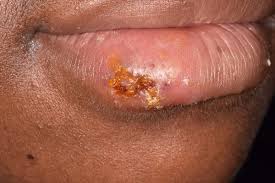It often starts as a subtle flicker — a tiny itch, a gentle warmth on the lip — something easy to overlook.
Yet, beneath this faint signal lies a hidden culprit: a dormant virus awakening after months or years of silence, ready to rewrite your day with a painful and unmistakable outbreak. If you’ve ever wondered why a sunny afternoon or a restless night suddenly leaves you nursing painful blisters, this guide will reveal the surprising triggers and truths behind those pesky cold sores.

What Are Cold Sores, Really?
Cold sores, also called fever blisters, are caused by the herpes simplex virus type 1 (HSV-1). Though generally harmless, these blisters are highly contagious, often painful, and frustratingly recurrent because the virus never fully leaves your body. Instead, it hides out in nerve cells, waiting for the right moment to flare up again.
How Do You Catch It?
HSV-1 is usually contracted early in life, often through close contact like kissing or sharing utensils. Once infected, the virus lies dormant, capable of reactivating later. While HSV-2 is mostly linked to genital herpes, either strain can infect different areas depending on exposure.
Triggers That Wake the Virus
Even when “asleep,” HSV-1 can be jolted awake by:
Emotional or physical stress
Illness such as colds or fevers
Weakened immune system
Hormonal changes (like menstruation)
Sun exposure, especially on the lips
Lack of sleep or fatigue
Outbreaks typically appear around the lips, nose, chin, or nearby skin.
Spotting the Early Signs

Before blisters appear, you might notice:
Tingling, itching, or burning sensations on the lip or surrounding area
Redness or swelling in that spot
Within a day or two, clusters of fluid-filled blisters emerge, eventually breaking open, oozing, crusting over, and healing within 2 to 4 weeks.
Managing Cold Sores
While there’s no cure for HSV-1, timely treatment can ease symptoms and shorten outbreaks:
Antiviral medications like acyclovir or valacyclovir work best when started at the first tingling or redness.
Over-the-counter creams with docosanol or topical anesthetics help soothe pain.
Pain relievers such as ibuprofen or acetaminophen reduce discomfort.
For frequent flare-ups, doctors may recommend daily antiviral therapy to suppress outbreaks.
Natural Comforts
Some natural remedies may offer relief (test skin sensitivity before use):
Aloe vera soothes irritated skin
Lemon balm may slightly speed healing
Diluted tea tree oil has antiviral effects (use with caution)
Petroleum jelly or lip balm protects and moisturizes cracked skin
Preventing Future Outbreaks
To keep cold sores at bay:

Manage stress and prioritize good sleep
Use lip balm with SPF when outdoors
Maintain a balanced diet, exercise regularly, and stay hydrated
Keeping Others Safe
Cold sores are most contagious when blisters are present. To prevent spreading the virus:

Avoid kissing and close contact during active outbreaks
Don’t share lip products, drinks, utensils, or towels
Wash hands frequently, and avoid touching sores—especially before touching eyes or other sensitive areas
When to See a Doctor
Seek medical advice if:
Outbreaks occur frequently (six or more per year)
Sores are unusually painful or slow to heal
Blisters appear near the eyes (risking serious complications)
You have a weakened immune system
Looking Ahead
Though no permanent cure exists yet, research continues toward better antivirals, vaccines, and novel treatments. For now, early intervention and smart prevention remain your best tools to reduce pain, shorten outbreaks, and protect others.
In Summary
Cold sores, triggered by the ever-present HSV-1 virus, can flare up unexpectedly from stress, illness, sun, or hormonal shifts. Recognizing early symptoms and acting quickly with antiviral treatment can ease suffering and limit spread. With practical self-care—like lip SPF, stress management, and avoiding close contact during outbreaks—you can keep cold sores under control.
And if outbreaks worsen or complications arise, medical support is key. While the virus stays for life, effective management makes living with cold sores far more manageable—and science offers hope for even better solutions down the road.
